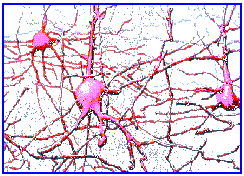Remote Ready Biology Learning Activities has 50 remote-ready activities, which work for either your classroom or remote teaching.
Serendip is an independent site partnering with faculty at multiple colleges and universities around the world. Happy exploring!

Welcome to the home page (http://serendipstudio.org/bb/neuro/neuro99) of Biology 202 at Bryn Mawr College.
For more on lateral inhibition: http://serendipstudio.org/bb/latinhib.html
For more on frogs: http://serendipstudio.org/~pgrobste/PGlab/FrogIntro.html
And variability:Variability in Brain Function and Behavior
And consciousness and the I-function: http://serendipstudio.org/bb/consciousness/
from Emily Dickinson (1830-1836):
Some course starting points
|
The Brain - is wider than the Sky - For - put them side by side - The one the other will contain With ease - and You - beside-
The Brain is deeper than the sea -
The Brain is just the weight of God - |
Tell all the Truth but tell it slant- Success in Circuit lies Too bright for our infirm Delight The Truth's superb surprise As Lightening to the Children eased With explanation kind The Truth must dazzle gradually Or ever man be blind - |
And from history:

| Mind and Body: Rene Descartes to William James | 
|
Topics for weekly essays (click to see responses)
TOPIC 1
It was asserted in class that "the brain is behavior ... there isn't anything else". If you are (appropriately)
skeptical about this assertion, describe what aspects of behavior (including human experience) you think will
not be accountable for in terms of the organization and function of the nervous system, and explain why. If you
are (equally appropriately) inclined to agree with the assertion, describe what aspects of behavior (including
human experience of it), you think will be most difficult to make sense of in terms of the organization and
function of the nervous system, and suggest how these might usefully be explored. Or discuss the significance of
the assertion, what broader implications it does (or doesn't) have.
TOPIC 2
A general theme that emerged this week is that the nervous system consists of a lot of different parts
which normally function together in a coordinated way, but which can and do, under some
circumstances, function more or less independently of one another. If the brain=behavior assertion is
valid, this perspective should hold for behavior as well as for the nervous system. Does it? Is it a useful
perspective in the context of behavior? Can you think of examples of behavioral phenomena which are
more understandable in terms of coordinated elements that are sometimes less well coordinated?
TOPIC 3
We've spent a good part of the past week talking about properties of neurons, and will spend at least a part of
next week continuing that discussion. Its interesting, in looking through the forum for the past two weeks, that
most of the things people are interested in and talking about (e.g. souls, self, consciousness, choice, mental
illness) seem rather remote from neurons. Given this, do you think its worth spending as much time as we are
on the properties of neurons? Is it likely that understanding neurons better will contribute useful insights into
some of these other topics? If so, how?
TOPIC 4
In what ways does an understanding of the properties of neurons and of synaptic interactions between them
provide new and useful ways to think about behavior?
TOPIC 5
Central pattern generation, corollary discharge, action as a "motor symphony", reafference, and genetics are among the things we've discussed in the past two weeks. In what ways have one or more of these gone beyond action potentials, synaptic potentials, and so forth in causing one to think differently about behavior?
TOPIC 6
Pleurobranchea might or might not withdraw its proboscis when it is hit, depending not on some other
sensory input but rather on the presence or absence of a corollary discharge signal. Is this what we mean
when we speak of "choice"? When I (or you) "choose" to do one thing or another is it because of corollary
discharge activity, or is something else involved? If so, what?
TOPIC 7
We ran into the "I-function" again, in talking about effects of damage to the motor cortex (earlier from
talking about quadriplegics). And we'll run into again later in the course. For now, how well-defined
and/or useful is this idea? In thinking about the nervous system? In thinking about behavior? Is it
something we have to think about? Can one imagine it in terms of neurons, or of interacting circuits of
neurons?
TOPIC 8
We've switched from the output to the input side of the nervous system and, in particular to talking about the visual system. In thinking back over our discussions of the blindspot, lateral inhibition, and color vision, what general principles emerge? For sensory processing? For thinking about behavior? Can you think of instances other than those talked about where these principles may apply? What new questions are raised?
TOPIC 9
So ... after another week talking about the sensory side of the nervous system, what does all this have to say about the "picture in your head"? about "reality" and the human perception/conception of it?
TOPIC 10
We had a look between the sensory and motor sides of the nervous system and found, among other things, evidence for "intrinsic variability". Is this a well-defined, useful concept for understanding the nervous system? Does it have implications for better understanding behavior?
TOPIC 11
If brain=behavior, then learning something about the brain (nervous system) ought to produce changes in how you
think about behavior (your own, that of other humans, that of animals). In what ways has your understanding of
behavior changed over the semester? What new questions have arisen in your mind? (Thoughts from the beginning of the semester are available here).
| Course Home Page
| Back to Brain and Behavior
| Back to Serendip |